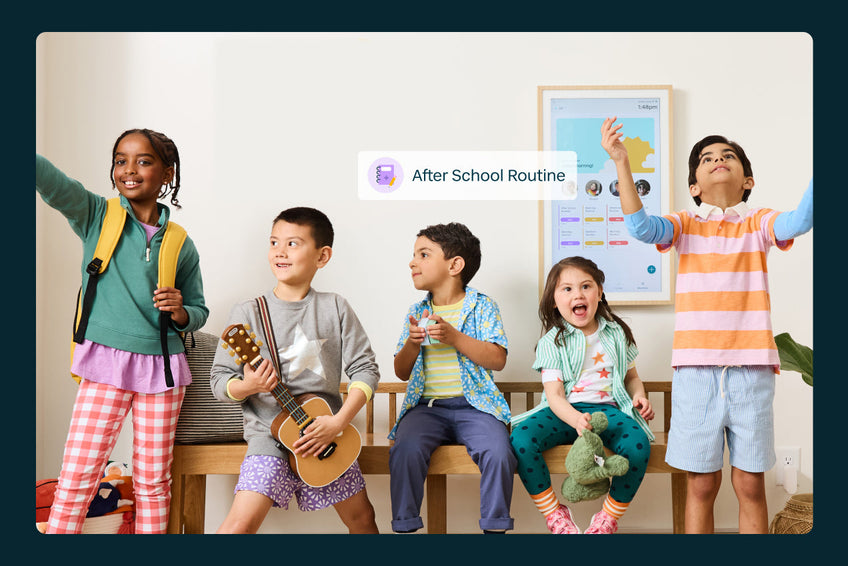Using Visualization To Instill Responsibility, Plus Meet Hearth Helper
We hear stories all the time about the ways families attempted to centralize their calendars before Hearth ranging from color-coded sticky note systems to magnetic white boards with ad hoc grids made of tape. Having a calendar, for a lot of people, is a non-negotiable. Keeping that calendar orderly, accessible, and flexible is the tricky part. We call Hearth “the operating system for the modern family” because we see it as so much to connect households as a unified front. Keeping a clear calendar is an essential component of our mission.
We know that calendars are a critical tool for coordination and awareness. When it comes to mitigating the mental load, they’re great for tracking tasks like caregiving, house work, and general administration. Coordinating routines—from work to home to even the occasional date night—helps give every task an equal sense of purpose. Life is rarely predictable, but a calendar can create a sense of pattern that’s been proven to be beneficial for humans across the board, beginning with infants.
The Power of Planning
It’s a common practice for elementary school teachers to begin the start of each day with a calendar review. By equipping students with the basic knowledge of the day of the week, what the day’s schedule holds, and what they can expect, children feel empowered with context. It turns out, adults are the exact same way.
Building anticipation is one of the unsung benefits of keeping a family calendar. Recall paper chains hung weeks out from holidays or family vacations as a kid. There’s something undeniably exciting about watching something you’ve been waiting for approach. Kids can count the days until Grandma’s on the calendar instead of relying on verbal updates from parents. On the contrary, calendars keep changes front-of-mind for everyone in the family. Let’s say a different caregiver is picking your kids up from school? Being able to clock this on the calendar gives kids a sense of awareness. For younger kids, visualization could be the difference between a smooth transition and an overwhelmed meltdown.
Referencing a visual calendar is an easy way to strengthen executive functions, like planning and time management, in kids. With a sense of flow in mind, kids can see how their activities contribute to the family’s overall schedule. Knowing one parent might be away for work in a week becomes a chance to plan a date to the children’s museum the weekend before, for example.
When a child asks about what’s next, your response can be a shift from being the source of this information to encouraging independence. “Good question. Why don’t you go check the calendar on the Hearth?” A shared visual format is key to increasing children’s accountability. And this way, chores become an independent pursuit without constant check ins and verbal cues. Having one point of reference as a family is an intentional step toward greater awareness, more connection, and instilling responsibility.
Integrating your Google Calendar
Adding your pre-existing Google Calendar it your Hearth is simple. During your initial setup, choose the prompt to log in to your Google account. At this stage, you can invite other family members as well. If you’d like to add a Google account after your Hearth has been set up, simply use Hearth's web app to manage your calendar preferences.

Meet Hearth Helper
Think of Hearth Helper as a superhero for your family’s organization. Digitize your events, meal plans, chores, and grocery lists, directly through the Hearth Companion app - all with photo digitization and approval-based control. Say you rescue a printed schedule of this weekend’s tournament from your kid’s soccer bag, need to upload a weekly lunch schedule, or want to add your back to school shopping list. Just send the image to Hearth Helper, and it will digitize the information for you. Review, approve, and voilà—it's on your Hearth!
3 Tips For Teaching Kids About Using A Calendar
1. Model calendar usage.If you take the time to showcase how you rely on Hearth for your own daily routines, the rest of your family will follow suit. The more you utilize the device’s functions, the more helpful it becomes.
Keep fun activities, like play dates and weekends away, as front of mind as dental appointments and car washes. Celebrate the exciting everyday moments with kids, reminding them that planning can be joyful.
Going off the calendar keeps things spontaneous. Achieve this by blocking some time every week or so for the family. Kids will know to expect your undivided attention, and you can delight them with off-the-cuff quality time like an ice cream run or extra screen time for a family movie night.




